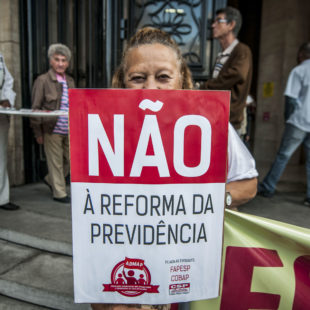20/02/2018 15:15

President Temer greets the military commander. (Photo: Alan Santos/PR/F. Públicas)
Last week, Brazil’s National Congress approved a Presidential Decree authorizing federal intervention in the State of Rio de Janeiro. Even before the overwhelming votes in both houses, President Michel Temer had withdrawn an “urgent” call for Congress to vote a Constitutional Amendment to reform the Social Security system, since the Constitutional cannot be amended while an intervention is in force in any State. This formal excuse for giving up on Social Security reform was an easy way out for the government to avoid recognizing it would not be able to produce the votes it needed to have it passed.
Temer’s administration had made pension reform a cornerstone for its legitimacy within Brazil’s ruling class, while refusing to dialog with the rest of society and disdaining the resistance of social movements and public opinion in general. Despite its insistence and even the hypocritical slogan of putting an end to “privileged” public employees’ retirement plans – while simply ignoring proposals that would sacrifice powerful corporate interests – even the shameful fabrication of data to prove Social Security was bankrupt was not enough to garner enough votes in Congress to even risk a vote on this blow to working people. Its impending defeat forced the government to take defensive steps. Now, it hopes to push through easier-to-approve bills of law, such as privatizing the federal electric power corporation, Eletrobrás, and mandating autonomy for the Central Bank, both of which are measures demanded by the “market.”
Yet we must not underestimate the gravity of the intervention in the State of Rio de Janeiro. Much more than a mere distraction, it is rather a sign of this illegitimate government’s ongoing political shift towards authoritarianism. Whistle blowers had already identified the intensification of a permanent State of Exception in effect for residents of favelas, peripheries and low-income neighborhoods. It is frightening for us now to witness the National Congress legitimizing official guidelines and repressive practices with a tremendous potential for human-rights violations, such as the declaration of low-income neighborhoods as “hostile territories” upon the identification of criminal militia or drug traffickers. The official green light for the use of lethal force, although it has long been the daily practice of local security forces, is a significant new step in this escalation of both symbolic and actual violence.

(Photo: Rodrigo Zaim/Voz do Aposentado)
Against the backdrop of the federal intervention, we can only deplore the intensification of the kind of violence that favelas, peripheries and low-income neighborhoods have been suffering under police operations, shoot-outs between criminal gangs, the shut-down of schools and clinics, deaths and injuries of relatives and friends, break-ins of homes, etc. The coming months may aggravate the media’s exploitation of police operations as spectacles, along with what many in Rio have called “a public-safety policy that sickens favelas.”¹ People who live in favelas, especially blacks, know what’s coming and are already preparing a “best behavior” routine to protect themselves: don’t go out without your ID, tell your friends and relatives where you’re going, and keep your mobile phone charged to be able to make emergency calls or film frisks and possible human-rights violations.
All the talk about the timing of Temer’s intervention in Rio de Janeiro also reveals how hard it is for society to grasp the meaning of this step towards authoritarianism and increasingly militarized governance. The language of the Decree itself generates confusion and raises doubts by prescribing the “military nature” of the commander’s office. Some experts have said the Decree is unconstitutional,² since Article 21 of the Constitution requires that a civilian be named to command such a federal intervention.
Once again, with his political survival at stake, President Temer shows he could care less about threats in Brazil to legal security and institutional stability, both in critical condition since the impeachment of President Dilma Rousseff. Bucking the assessment of most public-safety experts, including military thinkers, the ruling clique is recklessly exposing the armed forces themselves to the prospect of a tremendous loss of face, with the likelihood of frustrated expectations regarding the mission they have been given.

Don’t militarize life! (Photo: Fernando Frazão/ABr)20
The illegitimate government’s maneuver to shift the country’s political agenda obviously lacks any serious planning of how to handle structural aspects of public safety in Brazil, and Rio de Janeiro in particular, which would necessarily begin with a profound restructuring of State police forces. Since this is not on the agenda, we cannot exclude the possibility that string pullers in the President’s office are edging towards an extra-legal and dictatorial regime.
[1] See coverage by Blog da Luiza Sansão, in Outras Palavras.
[2] See coverage by Sérgio Rodas, in Consultor Jurídico.










